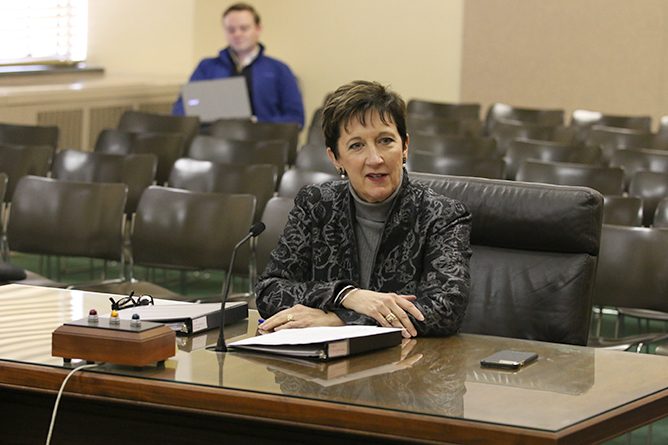Bill would establish affirmative consent standard for sex
The Judiciary Committee heard testimony Feb. 9 on a bill that would establish an affirmative consent standard in deciding cases of sexual assault.

Under LB988, introduced by Lincoln Sen. Patty Pansing Brooks, people must have a knowing and voluntary agreement, freely given, to engage in sexual contact. Pansing Brooks said it would better protect victims of sexual assault under the law.
“This is more than a definitional change—it is about empowering survivors of sexual assault who seek justice from their attacker,” she said. “It reframes the way our legal system approaches situations in which an individual did not give voluntary consent in sexual encounter.”
The existence of a current or previous dating, social or sexual relationship would not imply consent. Similarly, a person’s clothing or alcohol and drug use would not constitute consent.
Consent given under instances of force, fraud or coercion also would be considered invalid under the bill.
Miranda Melson, vice president of PREVENT UNL, spoke in support of the bill. After she was raped, she said she reported it to university officials but was told the encounter was consensual because she never said “no.”
“‘Yes means yes’ is based on enthusiasm and ongoing dialogue,” Melson said. “It is not to punish people caught in seemingly ambiguous situations, but to prevent situations from being ambiguous in the first place.”
No person should be presumed to be constantly consenting to sexual activity, said Planned Parenthood representative Meg Mikolajczyk.
“Seeking permission instead of assuming consent is exceptionally important in the way power imbalances present themselves,” she said. “Affirmative consent restructures the power dynamic and allows people to actively set their boundaries.”
Representing the Women’s Foundation of Lincoln and Lancaster County, Kathleen Uhrmacher also supported the bill.
“This reframes the way consent is viewed and thus moves the onus from victims of sexual assault to the perpetrators,” Uhrmacher said. “By requiring both partners to make a conscious, voluntary affirmative agreement to engage in sex with each other, LB988 empowers sexual assault victims and establishes clear boundaries.”
Opposing the measure was Molly Keane, representing the Nebraska County Attorneys Association. She said she admires the motivation behind the bill but testified that the language was confusing and could make it more difficult for prosecutors to prove cases against sexual assault perpetrators.
“We’re responsible for proving every element of a crime beyond a reasonable doubt,” Keane said. “This would force the defense to prove something, rather than forcing the state to prove its case.”
The committee took no immediate action on the bill.


